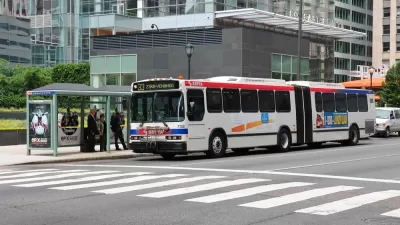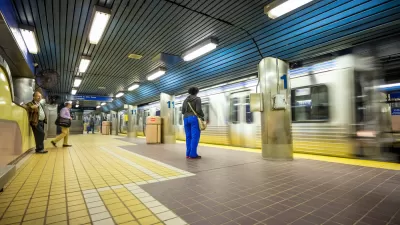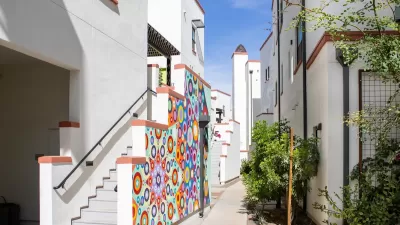While not all parts of the city are equally accessible, its central district boasts one of the nation’s densest transit networks and high ridership rates.
!["I [heart] Philadelphia" sign in front of fountain with city hall building in background](/files/styles/featured_small/public/images/AdobeStock_514479381_Editorial_Use_Only.jpeg.webp?itok=UkGD4UWa)
A report from CoworkingCafe rates Philadelphia as one of the best U.S. cities to live in without owning a car, reports Ariana Perez-Castells in The Philadelphia Inquirer. “The study considered how often people walk, use public transportation, drive a car, or bike, as well as the cost of public transit and how packed public transit stations and bike lanes are, among other factors.”
One contributing factor is that Philadelphia’s public transit system has an unusually dense station network, with more than two transit stations per square mile. “And 21.4% of the population uses public transit, according to the report.”
The article notes that not all parts of the city are as accessible and walkable as the city’s center. Additionally, “Construction on sidewalks throughout Philadelphia is often a hurdle for pedestrians, says Guerra. Construction sites don’t always set up alternative safe sidewalks, so people are funneled into the road.
FULL STORY: No car, no problem: Philly is one of the best U.S. cities to live in without a personal vehicle

Planetizen Federal Action Tracker
A weekly monitor of how Trump’s orders and actions are impacting planners and planning in America.

Congressman Proposes Bill to Rename DC Metro “Trump Train”
The Make Autorail Great Again Act would withhold federal funding to the system until the Washington Metropolitan Area Transit Authority (WMATA), rebrands as the Washington Metropolitan Authority for Greater Access (WMAGA).

The Simple Legislative Tool Transforming Vacant Downtowns
In California, Michigan and Georgia, an easy win is bringing dollars — and delight — back to city centers.

The States Losing Rural Delivery Rooms at an Alarming Pace
In some states, as few as 9% of rural hospitals still deliver babies. As a result, rising pre-term births, no adequate pre-term care and "harrowing" close calls are a growing reality.

The Small South Asian Republic Going all in on EVs
Thanks to one simple policy change less than five years ago, 65% of new cars in this Himalayan country are now electric.

DC Backpedals on Bike Lane Protection, Swaps Barriers for Paint
Citing aesthetic concerns, the city is removing the concrete barriers and flexposts that once separated Arizona Avenue cyclists from motor vehicles.
Urban Design for Planners 1: Software Tools
This six-course series explores essential urban design concepts using open source software and equips planners with the tools they need to participate fully in the urban design process.
Planning for Universal Design
Learn the tools for implementing Universal Design in planning regulations.
Smith Gee Studio
City of Charlotte
City of Camden Redevelopment Agency
City of Astoria
Transportation Research & Education Center (TREC) at Portland State University
US High Speed Rail Association
City of Camden Redevelopment Agency
Municipality of Princeton (NJ)





























